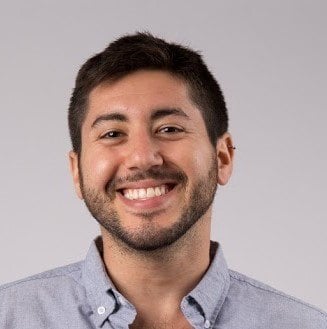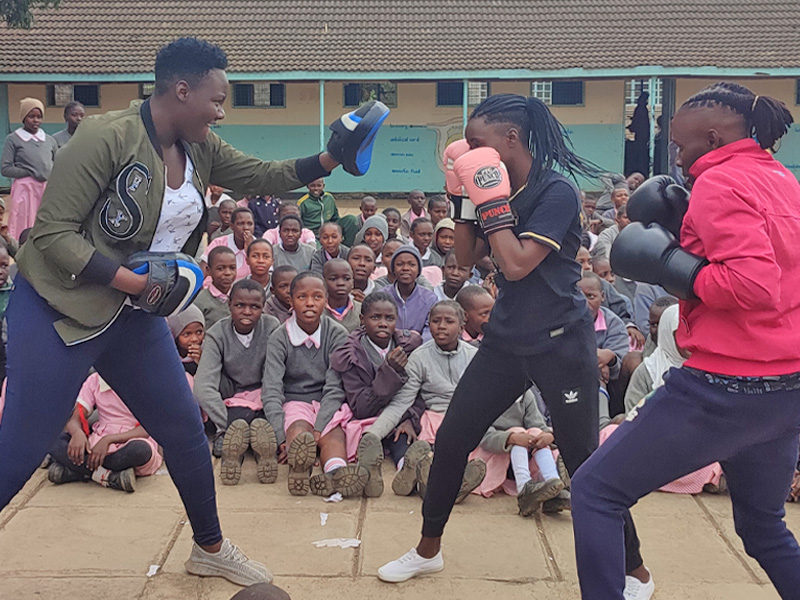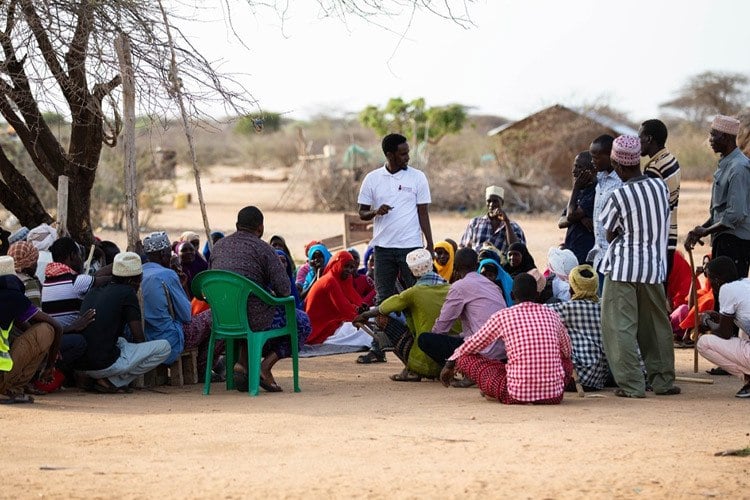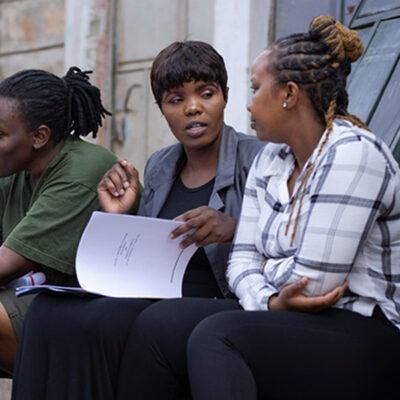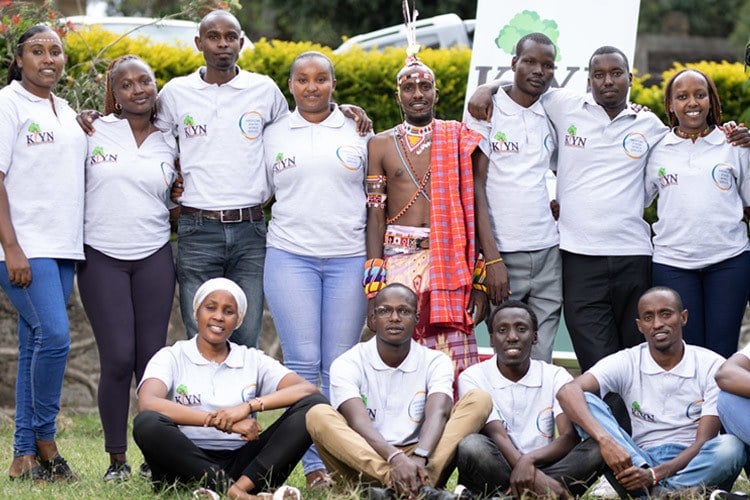
“I used to dodge elephants,” said Bernard Loolasho with a grin, pointing to a scar on his knee. “They’re very protective animals, and if the wind blows your scent towards them… well, they’ll charge.”
As a child, Bernard spent his afternoons avoiding elephants while grazing his family’s goats, sheep and cattle in the Mukogodo Forest, Kenya’s largest national forest reserve. He’s a proud member of the Yiaku tribe, one of Kenya’s 42 Indigenous communities—many of whom maintain their rural, pastoralist lifestyle even as climate change has curbed their abilities to hunt and gather food. While Bernard has since left behind his grazing days to live in the town of Nanyuki, today he serves his family — and his entire community — in a different way: he’s an activist, fighting for the rights of Indigenous people across Kenya.
Along with about 30 other young leaders, Bernard is a member of the Kenya Indigenous Youth Network (KIYN), one of AJWS’s newest grantees. In late 2022, KIYN held its second annual forum in Nakuru, Kenya — a two-day conference gathering 15 leaders representing 10 Indigenous communities — to meet, share, collaborate and strategize about how to help their communities survive in a rapidly changing world.
Myriad challenges plague Kenya’s Indigenous communities. The effects of climate change have hit them hard. Much of Kenya’s rural areas are in drought, making it difficult to grow food, find water and graze animals. And government abuse and discrimination has compounded the environmental crisis: Some KIYN leaders have watched their lands be torn up by major development projects that damage the environment and don’t benefit their communities. Indigenous communities are under-resourced by and under-represented in the government, resulting in a lack of hospitals, schools and other services.
What’s more, the fragmentation of Kenya’s Indigenous communities has made it too easy for the government to all but ignore these issues; Indigenous voices are dismissed, or never heard in the first place. The process to register community land, established by a new law in 2016, is extremely complex, and plagued by delays from local government officials that allow ancestral land to be developed without community consent.
Carson Kiburo, KIYN’s co-founder and a member of the Endorois community, aims to change all that by bringing together activists from Indigenous communities across Kenya, magnifying their power for change.
“There’s a sense of belonging in this room that cannot be replaced,” he said as Day 1 came to a close. “KIYN is building a sense of collective responsibility. We know each of our communities faces different issues, but here we understand how much we share as well. Sometimes all you need is to find the right people to help you advance your fight. Solidarity is everything. You’re not alone, and you don’t need to suffer alone.”
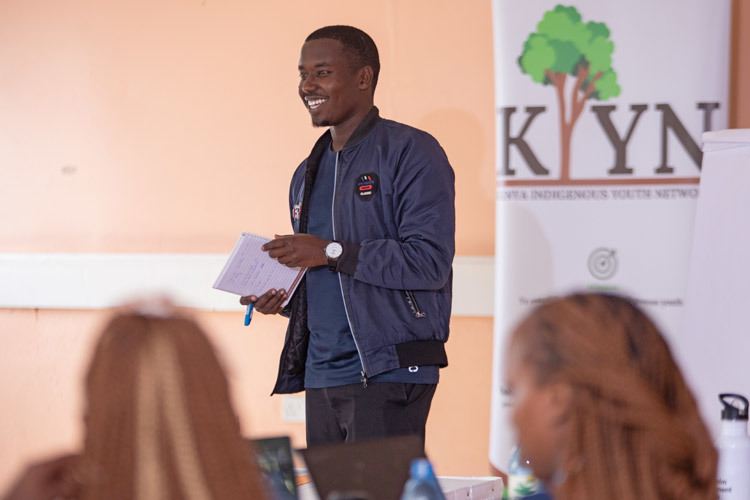
Different Communities, Shared Challenges
KIYN was founded by three intrepid young leaders acting on one of the core values of their communities: that knowledge, tradition and leadership must be passed from one generation to the next in order for Indigenous groups in Kenya to survive. That transfer of responsibility is just as important when it comes to their fights for human rights — fights that can take generations to win. The ‘Y’ in KIYN’s name — for “youth” — is a critical part of the organization’s mission.
Carson spoke with reverence about the knowledge of his community elders and the promise of younger Endorois members to bring about change. “We know amazing leaders will come after us, just as they have before us. We want KIYN to be the bridge between the elders of our communities and those who follow. The river that will flow to future generations.”
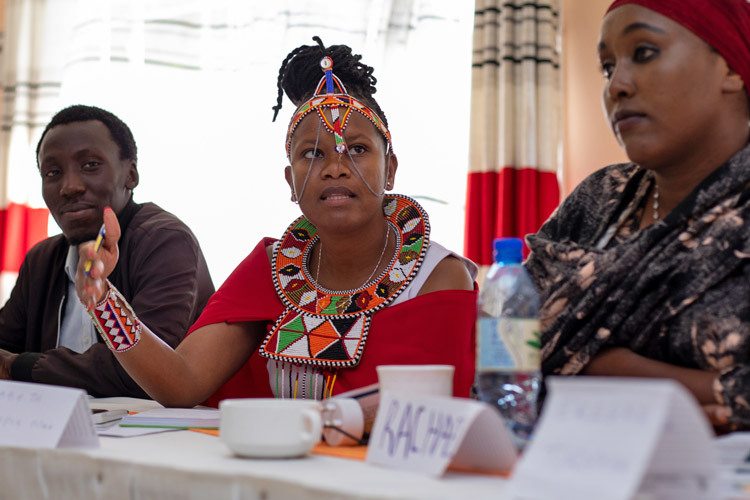
“Our stories are the same. There may be millions of Masai [one of Kenya’s prominent Indigenous communities], but their struggles are the same as communities of just 5,000,” he said. “No matter what, Indigenous groups can’t go to the government and say ‘Hey guys, you need to listen to our concerns.’ They’d say, ‘Who are you?’ But when you come together, you force them to listen. It’s a cliché that works: there’s power in numbers. And unity is our strength.”
KIYN is still a brand-new organization; for many of its members, the forum was the first time they were meeting this many other young Indigenous leaders.
Sintanai Virginia Lenachuru, from the Ilchamus community and KIYN’s youngest member at 19, left the forum ready to follow in her activist parents’ footsteps.
“I’ve always admired and looked up to the activism of my parents, and I’m so glad I’m involved now,” she said. “Because we are next in line. The future is waiting for us.”
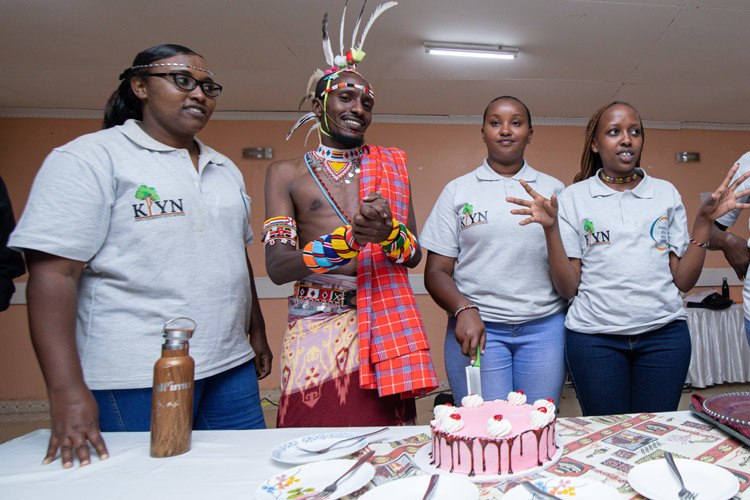
Joan Jeptoo Kibichum, 27 and from the Endorois community, plans to build on the forum’s momentum.
“The moment you go quiet, the government forgets about you. So we need more forums like this, more conversations, more collaborations with communities and NGOs, so we can rally numbers and create a true movement of Indigenous people,” she said. “Moving forward together — that’s the beauty of movements.”
Stand Back and Watch Them Run
In the last moments of the forum, as the participants wrapped up two days of intense policy debates and discussions of shared challenges, Eric Kimalt — an Endorois elder and Joan’s father — showed up by surprise, to praise the participants for “carrying the mantle forward” and to celebrate his daughter’s birthday with a cake.
He too spoke of solidarity, anchored in years of leading his community.
“When a wildebeest crosses a river infested with crocodiles, they cross together. They never cross alone. And when they cross, they stand on the riverbank to ensure the safe passage of all the other animals,” he said, before adding, with a laugh, “They, by the way, are also Indigenous.”
A few hours later, most of the KIYN crew had gone home — some on multi-day journeys to remote areas of Kenya. Carson sat down at a table to sip some tea, smiling, clearly exhausted, and already planning KIYN’s next steps — and his own.
At 35, Carson is already beginning to age out of this crew of young Indigenous activists that he helped create. Through KIYN, he’s able to cultivate an energy and drive to create change among activists just stepping into their power. This year’s forum was a massive success, he said, “And next year, I want to stand back and watch them run.”

